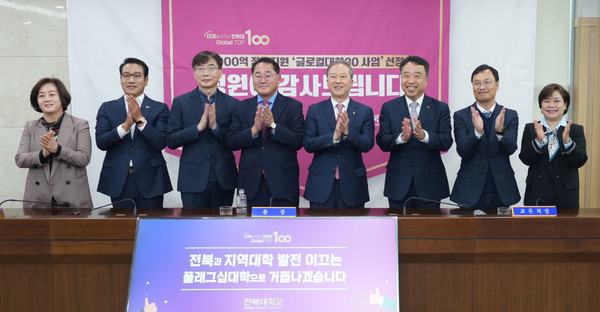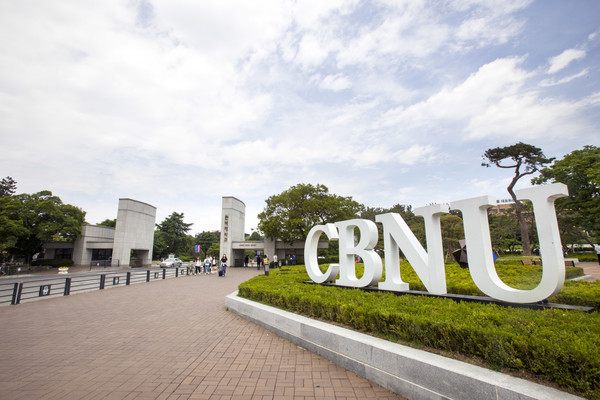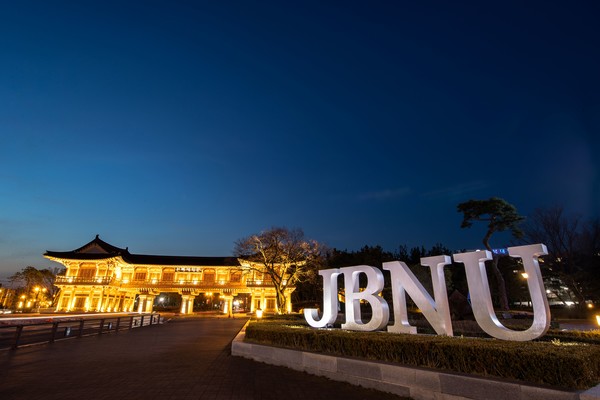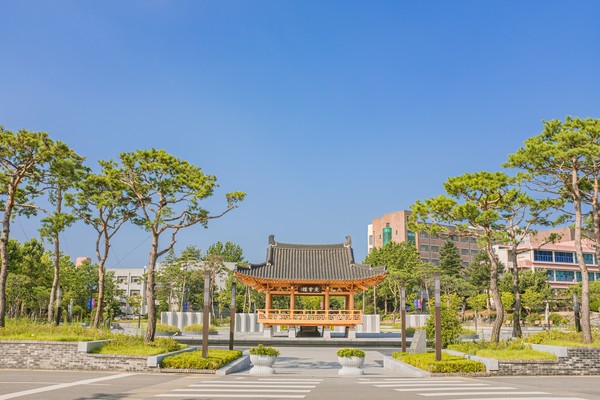Achievement made by 'one team spirit' such as JBNU, Jeollabuk-do, and municipal and county governments
"It is an opportunity for local and local universities to coexist and coexist"
Construction of University-Industrial City Triangle, innovation in Student-Centered University
Attracting five thousand international students, regeneration of local school closures, and promoting the role of a think tank

JBNU was finally selected as the "Glocal University 30 Project" promoted by the government to lead the university reform.
The Ministry of Education and the Glocal University 30 project committee conducted an in-depth evaluation and final deliberation on fifteen universities nationwide selected as preliminary designated universities for the project. As a result, ten universities, including JBNU, were finally selected as Glocal University 30 business universities on the 13th.
JBNU reflects the needs of the times and the suggestions of the members. With the vision of "A flagship university that leads Jeollabuk-do and local universities to the world in the future," to "Create a community of intellectual, industrial, academic, and research that can work and want to live." In addition, "Creating a barrier-free flagship university centered on students and a global university that international students want to come and resemble" were proposed as innovative models. Based on the RISE (Regional Innovation System & Education) ecosystem, it plans to lead the promotion of Jeollabuk-do's main and future new industries through regional industry-academia cooperation innovation, educational innovation, and global innovation.
First, for innovation in regional and industrial cooperation, the University-Industrial City Triangle, which connects Saemangeum - Jeonju, Wanju - Iksan, and Jeongeup in shaped as a triangle, will be established. It plans to utilize the strengths of each region, foster secondary batteries, and K-defense industries in the Saemangeum area, and foster sensor semiconductors and agricultural life and green hydrogen clusters in Jeonju and Wanju. Iksan and Jeongeup are planning to foster major high-tech industries in the region, such as pet bio and animal medicine. In addition, it will actively engage in regional issues by establishing a think tank for geography, industry, academia, and research through the establishment of the JBNU Regional Development Research Institute and the establishment of fourteen city and county research institutes under its wing. It also plans to regenerate the closed campus, which is Seonam University, and link it to regional revitalization. JBNU's Namwon Glocal Campus will be established at the site, operated by a customized Korean language school, and used as an incubator space for start-ups in specialized industries in Namwon.

In the field of educational innovation, new students are selected regardless of major by broadening the recruitment units of 106 departments to innovate into student-centered universities. In addition, it plans to guarantee student major options by expanding transfer, transfer, and double majors. Through the opening of a module major, the operation of a major selection system, and the operation of a digital competency education certification system, the government plans to change the regional modular academic structure, and completely break down the barriers between universities in Jeollabuk-do to fully open the campus and share various educational contents. In particular, it plans to invest 50 billion won in local expenses of the glocal budget to create and share educational content and establish a specialized program for local universities to induce specialization of each local university.
In addition, for global innovation, JBNU plans to attract five thousand international students and create a system that can contribute to regional economic development by working in the local region. In order to attract excellent students, the 'JBNU International Campus (Center)' will be established and various degrees and scholarship systems will be used. On the other hand, it is drawing a blueprint for improving differentiated settlement conditions through specialized education in connection with the Jeollabuk-do industry and the expansion of family dormitories. It will also enter the global "Top 100" in specialized fields and foster basic protection of academic fields by strengthening global employment capabilities and establishing an excellent academic development system through the dispatch of glocal students and diversification of glocal PBL (Problem-Based Learning).
To promote this project, JBNU has focused on the capabilities of universities and regions. The reorganization was carried out in August to strengthen student-centered future education. Two times of public hearings and student surveys were conducted to actively collect student opinions. Briefing sessions and undergraduate (department) consultations for each college were completed. In addition, the final consent process was completed through a school meeting at the end of September after a member briefing session to confirm the recruitment unit plan.

In a final student survey in September, more than 80% of the 2,800 participating students gave their absolute support, including in favor of the academic restructuring plan. In addition, 45 agreements have been signed for the win-win development of local universities, leading research institutes, local universities, and local universities, and 21 agreements have been signed, including foreign embassies, overseas universities, and research institutes, to establish strong cooperative relationships.
It was analyzed that cooperation with local governments along with Jeonbuk National University's own innovation plan was a major factor in selecting our university's Glocal University 30 project. The 8th popular election of Jeollabuk-do has agreed to and joined forces on regional innovation through education between local governments and universities. This strengthened cooperation has led to the selection of Glocal University 30 projects following the Ministry of Education's biggest core projects, the Local-University Cooperation-Based RIS project (Regional Innovation) and the RISE.
In fact, Jeollabuk-do actively cooperated to create JBNU to be a Glocal University. Governor Kim Kwan-young decided to provide 50 billion won over five years to help JBNU become Jeollabuk-do's innovation engine through drastic innovation despite the poor financial situation, and promised a total of 95 billion won to Jeonju and Namwon.
The budget will be used to co-exist the entire region and local universities. It will be used to seek joint countermeasures to overcome the crisis in universities and communities, and exchange professors and research personnel. In addition, it will also be used in areas such as student exchange and mutual credit recognition, joint development and operation of curriculum and educational contents such as comparison and programs, and joint discussions for establishing university specialization strategies.

On September 22nd, President Yang O-bong, Governor Kim Kwan-young, and presidents of other ten four-year universities in the province signed a "business agreement to foster glocal universities."
Jeollabuk-do plans to support the development of local industries by cultivating talented people in high-tech fields and innovating R&D in the future with Glocal University and JBNU. Beyond solidarity between local universities, the province plans to take the lead in establishing strong governance to draw close communication and cooperation between local governments, universities, and industries.
In addition, with the launch of Jeollabuk State in next January, it plans to support the promotion of Glocal University 30 projects through regulatory reforms and special cases related to higher education.
President Yang O-bong said, "The final selection for the Glocal University 30 project is a great joy and blessing not only for JBNU but also for the Jeollabuk-do. I will try to bring together JBNU's excellent infrastructure and pan-regional capabilities so that students can study as much as they want, lead to the win-win development of regional and regional universities, and help JBNU leap into a global hub university."

